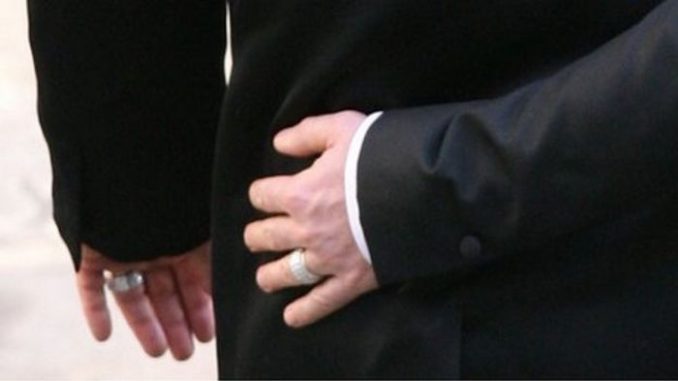
The identity of a married celebrity couple currently embroiled in an extramarital threesome scandal has been blocked from being reported in the UK after a High Court judge granted an injunction barring British media outlets from naming the famous pair.
The outdated and draconian privacy law have forced British readers to take to social media to find out couples identity, whilst the UK press have had to remain silent – much to their frustration.

BYPASS THE CENSORS
Sign up to get unfiltered news delivered straight to your inbox.
You can unsubscribe any time. By subscribing you agree to our Terms of Use
Latest Video
The well-known couple were first named in the U.S. as Sir Elton John and husband David Furnish. It was reported in the National Enquirer that David Furnish cheated on Elton with another non-celebrity couple. Furnish took out the High Court injunction to keep his extramarital “threesome” a secret to the British public when the other couple decided to go public with their story.
Dailymail.co.uk reports:
Earlier this year, however, the couple approached a newspaper offering to tell their story.
A High Court judge initially turned down an application for a privacy injunction from the celebrity because his infidelity contradicted his public portrayal of married commitment.
He went to the Appeal Court where judges said he was in the entertainment business and married to ‘a well-known individual in the same business’.
In the public ruling, Lord Justice Rupert Jackson said the couple had an open relationship and the spouse accepted the celebrity had sexual encounters from time to time.
He said a story would generate a media storm, public interest in the family, and press attention directed at the children. It would be ‘devastating for the claimant’ and the need for privacy was stronger than the right to publish.
The ruling meant the British media was banned from publishing the story.
The situation is a ‘farce’ making an ‘ass out of the law’, according to Tory MP Philip Davies.
The celebrity’s infidelity being reported in the US means it can potentially be read about by all 319million Americans. This is expected to spark countless posts online.
Bob Satchwell, executive director at the Society of Editors, said injunctions were draconian, outdated and ludicrous.
‘On one level, it means people who buy these injunctions are wasting their money,’ he said. ‘But it is quite ridiculous that people elsewhere can know about the story but people in Britain are not allowed to. It makes a mockery of the system.’
And John Hemming, the former Lib Dem MP who exposed Ryan Giggs’s infidelity in the House of Commons in 2011, said it left judges looking out of touch.
‘King Canute showed he could not hold back the waves, and he was making a point that our judges would be wise to learn from,’ he said.
The Appeal Court ruling by Lord Justice Jackson and Lady Justice Eleanor King that the infidelity is a private matter under human rights law, and not of any public interest, means British newspapers and broadcasters may not name them.
Until yesterday the judges’ decision shielded the celebrity from public exposure of his infidelity to his spouse and ensured that his longstanding claims of commitment to his partner will go unchallenged.
The fact that his behaviour is now public in America while censored from newspapers in this country means the return of controversy over the way judges have developed the privacy injunction, in which the rich and famous appeal to human rights law to suppress unflattering news about themselves.


